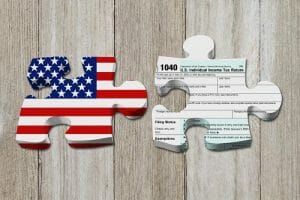US Expats Resent Continuing US Tax Requirement

Greenback report that 67% of US expats do not believe there should be a requirement for filing US taxes marginally up from last year. This number has remained relatively consistent over the past four years, and it’s not hard to understand why: the US remains only one of two countries with a citizen-based taxation system.
The survey showed that for 57% of US expats the tax issue they most want addressed is the repeal of citizenship-based taxation. The second issue of concern is a simplification of the tax process and just under 20% of expats said this would be the most helpful step the American government could take to aid them in filing US taxes.
Overall 4.3% of expats surveyed are planning to renounce their citizenship, 17.5% are seriously considering renouncing their US citizenship and 43% are not currently considering renunciation but would not rule it out. The major driver to expats considering renouncing their citizenship with 38% doing so because of the tax burden imposed on US citizens. Another consideration is the direction of the US government with 18% citing this as their reason for considering renouncing their citizenship.
Adding to expats’ overall disappointment with the American government is that the tax reform has been enacted with no major simplification to their reporting requirements. Of the expats surveyed, 64% intend to vote in the upcoming November 2018 elections. American expats make up approximately 2.7% of the US population and are very frustrated as a group about how the US government treats them. If expats can turn out in great numbers, they could feasibly have a big impact on the upcoming elections.
6% of expats were not familiar with FBAR (Foreign Bank Account Reporting). Greenback point out that if the survey data is representative, that could mean over half a million expats are at risk of prosecution for failing to comply with requirements of which they were not aware. This includes facing civil monetary penalties of up to $12,459 per violation judged to be non-wilful. And for wilful violations, the penalty may be $124,588 or 50 percent of the balance in the account – whichever is higher.
The Streamlined Filing Procedures, an IRS amnesty program that helps taxpayers become compliant without facing penalties, also does not achieve a high awareness score with 46.5% of expats saying they had not heard of it. 33.5% of expats said they would like to use the procedures to get caught up.
In addition, Greenback say that as The Offshore Voluntary Disclosure Program will end on September 28, 2018, anyone who has not come forward to voluntarily disclose a wilful failure to report foreign assets has only a few months left to do so. The closing of the OVDP may be tied to a more stringent crackdown by the IRS using FATCA records. This also indicates that the Streamlined Filing Procedures may be closed, which could affect expats considerably. The IRS most recently published statistics for individuals filing the Foreign Earned Income Exclusion (form 2555) and the Foreign Tax Credit (Form 1116) in 2011. At that time, there were 449,277 Form 2555’s filed and 8,065,020 Form 1116’s filed. Greenback indicate that this implies that a significant number of Americans living abroad are still not compliant with the IRS and many individuals may not even be aware of the difficulties they will face if caught.
There is a clear indication from the survey that US expats do not feel that the US government represents them (86.3% of those surveyed) and of those expats who are seriously considering renunciation, 17.9% are doing so because their opinions differ so vastly with the current direction of the government.
The issues that US expats thought were most important were gun control (37.7%) and healthcare (34.5%). Expats also generally agree on the solution on these issues with 96.0% believing America needs to enact more regulations on gun control and 88% either agreed or strongly agreed that the US government should guarantee healthcare for its citizens.
The survey clearly indicates the unpopularity of the US tax system and how most do not feel in line with the current direction of US politics.